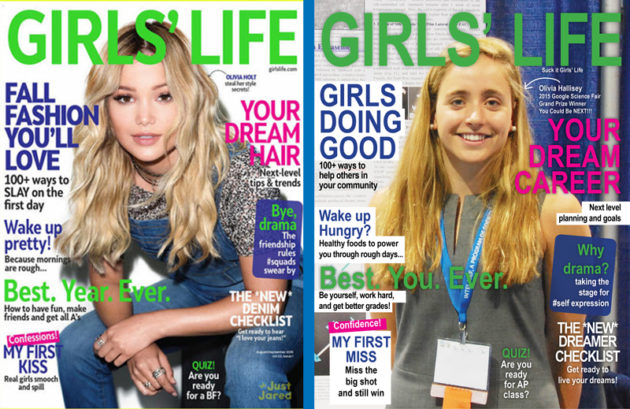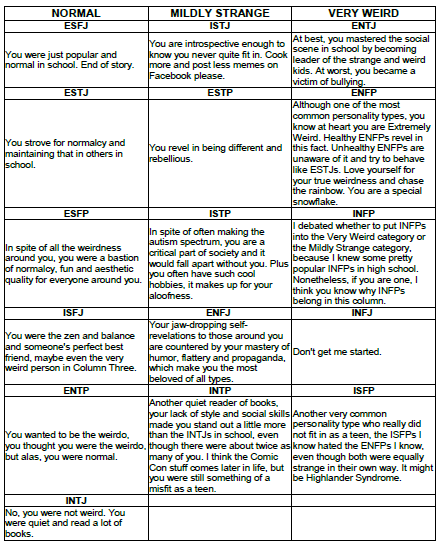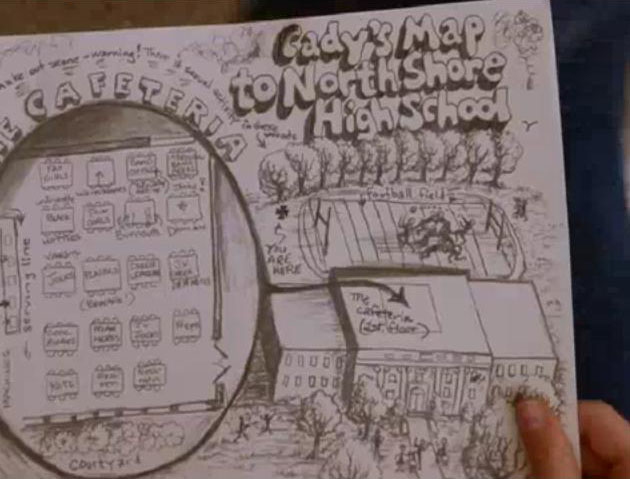I reveled in my weirdness and trolling teachers I did not like in high school, but my experience at my first university was a bit different. Fitting in was not so easy, and when we were tested for MBTI in a communication/psychology class my sixth semester, my uniqueness seemed to be confirmed in black and white (or was it black and manila?) when I found out I was the only ENTJ out of about 100 students in the class.
So what was my adolescence like as an intuitive? From what I’ve heard from other ENTJs, a lot more comfortable and happy than that of most other ENTJ females. I had the coaching and guidance of an ENFJ father, who told me even his very popular ESFJ sister, as well as his very popular girlfriends, would come home from school crying every day when they were my age. (Mind you, I knew nothing about MBTI or letters or any of this psychology stuff as a teen, other than a few things like OCD and a few books I had to read in seventh grade gifted class about crazy people – I’m typing based on what I know now.) I had academic mentoring and nerd empathy from the womb from my ENTP mother, to the point of irritation at times. She was the kind of mother who would brush off things like cheerleading and pep squads as “frivolous” and “bimbo” activities. Participation in drama and foreign language clubs were heavily encouraged instead, and I had no objection to that.

I’m older now. I’ve seen how my high school classmates have turned out because we have all kept in touch over the years. I do not have children of my own, but my siblings do. My friends also have kids. Each of them is unique. Young people are diverse and celebrate it nowadays. Some teens have sexuality or gender diversity and celebrate that. Some teens are on the autism spectrum and find others like themselves to connect with so they don’t feel so alone. I even know one young person who fits into all of those categories. However, there is still kind of a standard in schools of what is considered “normal” and what is considered “bully-able” behavior, and bullying is much worse these days than it was when I was a teen. I have heard the horror stories.
So when I make this list, I do so in a spirit of comedy, and if you see your personality type on a list that offends you, make the best of it and keep in mind where this author’s falls and realize that no one was spared from deprecation, not even herself. Celebrate what makes you unique and don’t let the bullies get the best of you.

I hope you realize this is a joke, but in case you didn’t, I’m kidding, okay?
Personality typing is far more complex than MBTI tests, especially the low-quality ones you take online. There is another test available that tests for levels of neurosis versus calmness (The Big Five). Surprisingly, you might be better at certain fields if you are “a weirdo” than others who are “normal”. My father often told me the story of Barbara Streisand, who used her very ethnic nose as her trademark in show business. (Apparently Jennifer Grey’s father never told her that story, and we haven’t really seen her in movies since Dirty Dancing.) What might appear initially as a disadvantage can become a unique asset. Use it as such.
You might be wondering why I have not written about The Big Five test before. It is because there is already plenty of information available on this test online. It is a good test and I like it. End of story.
And it will tell you legit for real if you’re weird.

DONT GET ME STARTED
I DIE HAHAHAHAHAHAHAHAHAHAHAHHAA
LikeLiked by 1 person
I strongly disagree with INTJ at “normal”. INTJs are at least at “mildly strange”.
It may be related to gender though, so male INTJs at “normal” and female INTJs at “mildly strange” / “very weird”.
-Being completely uninterested/oblivious to fashion, relationships & co,
-not having the facial expressions and body language to “match” the female gender,
-the outlandish (for others) theories,
-strange interests (at least for a girl)
-being able to stand up and call bullshit when you see one, even if it comes from authority figures like the teachers
-the introversion (= harder/impossible to make friends = allies in case of conflict; no group of friends = more likely you will be picked on),
-the fact that you have enough self respect to stand up for yourself: others who put their heads down when attacked and accept a very low status receive less aggression afterwards than the ones who keep trying to fight back – at least in the case of whole group against one person. Which almost always is the case.
-plus the fact that a girl who fights back isn’t feminine, girls should just start crying or something, which in itself results in more bullying on the gender identity line,
-starting regular physical exercise in order to build muscles to be more able to perform said fighting back = unfeminine, a girl in that situation should start crying and asking for help (from people who don’t believe/dismiss her) and then bitching and crying some more.
-also the said calling out bullshit = unfeminine, girls have to be submissive and stupid,
-being VERY smart and always knowing what you talk about when getting into a debate => unfeminine, real girls are submissive and stupid,
-the resulting lack of not only friends, but even casual pals from all the above
etc.
put you in a very bright spot of EXTREME WEIRDNESS and, in consequence, there’s a possibility for severe bullying from both boys and girls. And from teachers.
If you’re lucky, from family members too, who start seeing how “abnormally” you behave for a teenage girl (and yes, the act alone of reading a lot of books is abnormal behaviour for a teenage girl).
As a girl, you have to be a social animal full of smiles, small talk and drama over relationships. The more you stray from that, the more you become closer to the embodiment of weirdness and will be rigorously sanctioned by literally everybody.
If anything, the introversion in INTJ makes things much harder than for ENTJs, because it prevents them from having even the most elementary positive social interactions with anybody around them. It’s easier when you can at least sometimes tell a joke to somebody.
You have to ALSO TAKE INTO ACCOUNT WHAT IS EXPECTED OF THE GENDERS; it’s very important to this division of types because it highly increases/decreases the weirdness of a type depending of which gender the person is. Plus, a lot of grade/high school (or even college) bullying is based on that.
For example, I expect that INFP girls are more likely at “normal” / “mildly strange”, while INFP boys are perceived as “very weird”.
I had the direct experience of at least 3 ISFP girls in my high school group and they all fit in perfectly, probably because their F-ness allowed adaptation to enough “normal” behaviour to be accepted, so I strongly disagree with ISFP at “very weird” too. I’d put ISFP girls at “normal”, ISFP boys at “mildly strange”.
“Just being quiet and reading a lot of books” is ok, even perfect, IN THEORY, for what is expected of you in school, but from theory to practice is a long way to go.
LikeLiked by 1 person
The high school valedictorian was an INTJ female. Honestly, the only thing that came across as particularly unusual about her was that she read *a lot* (even compared to ENTJs and INFPs). One of my college roommates was INTJ and she blended in very well with student life. Having been her roommate, I knew she never went out, but most people didn’t notice anything unusual about her. I think a lot of the weirdness is blown out of proportion with the introverted intuition and introspective focus that INTJs have. You all do not particularly stand out in a crowd.
When I was in high school, I had a few ISFPs in my “weird friends” collection. One was the girl with the mohawk (in the 1980s) and another eventually became a raging club kid/drag queen of the Sisters of Perpetual Indulgence type. Type 4 ISFPs (and even ESFJs – yes, they exist) revel in their weird, misfit status, whereas INTJs, who tend to be Type 1 Reformers and Type 5 Intellectuals, don’t go out of their way to stick out and draw attention to themselves.
LikeLike